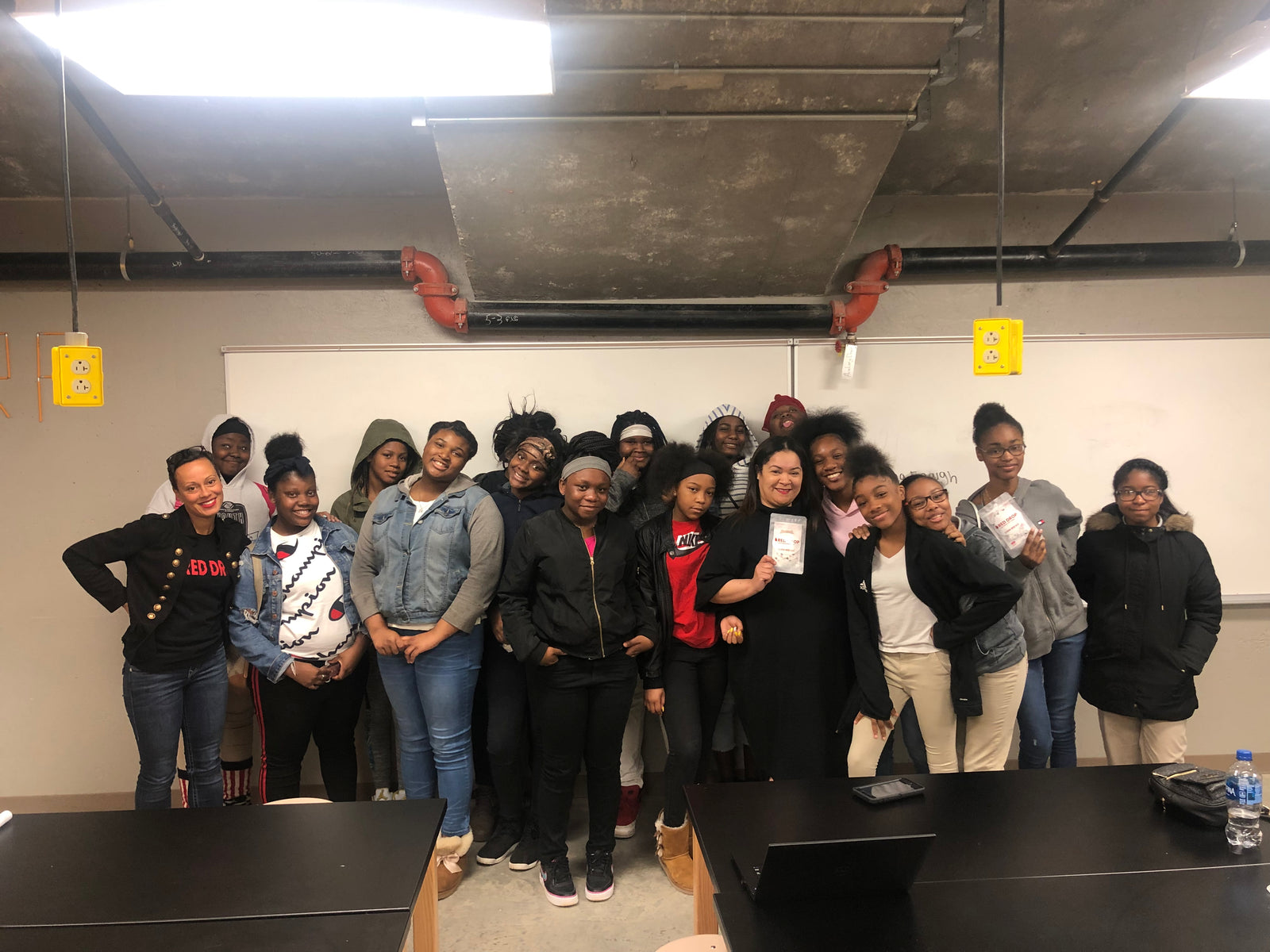One minute your tween is laughing at a funny video on Tiktok, and the next they're crying over something that seemed small. Sound familiar? If your tween experiences intense emotions before or during their period, you're witnessing something completely normal but often misunderstood: premenstrual syndrome, or PMS.
At RedDrop, we believe that supporting tweens through emotional changes is just as important as providing the right period products. Understanding why these mood changes happen and having practical tools to manage them can make this time less overwhelming for everyone in the family.
Understanding the Emotional Side of Periods
Why Hormones Affect Mood: Think of hormones as chemical messengers that influence how your tween's brain processes emotions. During the week or two before their period, estrogen and progesterone levels fluctuate dramatically. These same hormones that regulate the menstrual cycle also affect neurotransmitters like serotonin, which directly impacts mood, sleep, and appetite.
The PMS Timeline: PMS symptoms typically appear during the luteal phase of the cycle, which is roughly 7 to 10 days before the period begins. For many tweens, symptoms peak a few days before their period starts and usually improve significantly once menstruation begins.
What's Normal vs. Concerning: Normal PMS mood changes might include feeling more sensitive, irritable, or weepy than usual. However, if emotional symptoms are severe enough to interfere with school, friendships, or daily activities, it's worth discussing with a healthcare provider.
Common Emotional Symptoms in Tween PMS
Mood Swings and Irritability: Your tween might feel like they're on an emotional roller coaster, switching between different emotions quickly. Small annoyances might feel overwhelming, and they may react more strongly to situations that wouldn't usually bother them.
Increased Sensitivity: Things that normally roll off their back might suddenly feel deeply personal. Your tween might take comments from friends differently or feel hurt by situations they'd typically handle with ease.
Anxiety and Overwhelm: The combination of hormonal changes and the stress of managing period symptoms can create feelings of anxiety. Your tween might worry more about school performance, social situations, or feel generally overwhelmed by daily tasks.
Sadness or Crying Spells: It's common for tweens to feel sadder than usual or to cry more easily during PMS. This might happen even when they can't identify a specific reason for feeling upset.
Practical Emotional First Aid Strategies
For Parents: Creating a Supportive Environment
Validate Their Experience: When your tween says they're feeling emotional, believe them. Avoid dismissing their feelings as "just hormones." While hormones are influencing their emotions, their feelings are still real and valid. You can learn more about talking to your tween about periods.
Adjust Expectations Temporarily: During PMS time, consider giving your tween a little extra grace. This doesn't mean lowering standards entirely, but recognizing that they might need more support with tasks that are usually easy for them.
Offer Comfort Without Fixing: Sometimes your tween just needs acknowledgment that they're having a hard time. A simple "I can see you're struggling today, and that's okay" can be more helpful than trying to solve their problems.
For Tweens: Self-Care Tools That Actually Help
Name the Feeling: When emotions feel overwhelming, try to identify what you're actually feeling. Are you frustrated, sad, anxious, or angry? Sometimes just naming the emotion can make it feel more manageable.
Create a Comfort Kit: Just like having period products ready, having emotional comfort tools prepared can help. This might include your favorite tea, a cozy blanket, a playlist that makes you feel better, or a journal for writing out feelings. You can read our blog post here where we talk about our comfort favorites.
Use the 24-Hour Rule: If something feels devastatingly important during PMS, try waiting 24 hours before making any big decisions or having difficult conversations. Often, intense feelings become more manageable with time.
Conversation Starters for Difficult Moments
When Your Tween Is Overwhelmed: "I notice you seem stressed. Is this feeling connected to where you are in your cycle, or is something else going on?" This helps them connect physical and emotional patterns without dismissing their concerns.
When Small Things Feel Big: "That sounds really frustrating. Do you want to talk through what happened, or would you prefer some space right now?" This validates their feelings while giving them control over how to handle the situation.
When They're Being Hard on Themselves: "Your body is doing a lot right now with hormone changes. It makes sense that you might feel different than usual." This helps normalize their experience without making excuses.
Building Emotional Awareness Around Cycles
Pattern Recognition: Help your tween notice if certain emotions tend to appear at specific times in their cycle. This isn't about predicting mood swings, but about building self-awareness that can lead to better self-care.
Cycle-Synced Self-Care: Once your tween recognizes their patterns, they can plan accordingly. If they tend to feel more anxious before their period, they might schedule lighter social commitments during that time.
Communication Skills Teach your tween how to communicate their needs during PMS. They might say to friends, "I'm feeling extra sensitive today, so please be patient with me," or ask teachers for extensions on assignments when they're struggling.
When Mood Changes Become Concerning
While PMS mood changes are normal, some symptoms require professional support:
Severe Depression or Anxiety: If your tween experiences intense sadness, hopelessness, or anxiety that interferes with daily functioning, especially if these feelings persist beyond their period.
Extreme Anger or Aggression: While irritability is common, significant anger that affects relationships or leads to destructive behavior needs attention.
Thoughts of Self-Harm: Any mention of wanting to hurt themselves or not wanting to be alive should be taken seriously and addressed immediately with professional help.
Supporting the Whole Family
For Siblings: Help other family members understand that PMS mood changes aren't personal attacks. Create family agreements about giving each other space during difficult times.
For Parents: Remember that supporting a tween through PMS can be emotionally draining. Make sure you're also taking care of your own emotional needs during this time.
Communication Ground Rules: Establish family guidelines for respectful communication, even during emotionally challenging times. PMS explains mood changes but doesn't excuse treating others poorly.
Long-Term Emotional Wellness
Building Resilience: Help your tween develop coping skills that work beyond just PMS management. Emotional regulation skills learned during adolescence serve them throughout life.
Normalizing Mental Health Conversations: Use PMS discussions as opportunities to normalize talking about mental health. This creates a foundation for ongoing emotional wellness conversations.
Professional Support When Needed: Don't hesitate to seek help from counselors or healthcare providers who specialize in adolescent health. Getting support early can prevent more serious issues from developing.
Remember: This Phase Is Temporary
While PMS can feel overwhelming, it's important to remember that these intense emotional fluctuations often stabilize as tweens mature. Learning to manage PMS emotions teaches valuable life skills about self-awareness, self-care, and emotional regulation.
At RedDrop, we believe that understanding and supporting the emotional aspects of periods is essential for empowering tweens to thrive during this important developmental time. With patience, understanding, and the right tools, both tweens and families can navigate PMS emotions with confidence and compassion.
Your tween's emotions during PMS are real, valid, and manageable. By providing support, understanding, and practical tools, you're helping them develop skills they'll use throughout their lives.
LINKS:
Comfort favorites: Period Nutrition for Energy & Comfort: What to ...
Sterling P. Jones is a wellness writer and beauty expert who believes in empowering women through education. As the founder of The Beauté Study, she teaches women how beauty and wellness practices can be tools of personal power. Sterling specializes in cycle-conscious living and writes about the intersection of beauty, wellness, and feminine health. Her approach to period education combines cultural insight with practical guidance, helping young women understand their bodies as sources of strength rather than shame.













































